HAMMERS WIN BATTLE OF THE YOUNG UNS
BY Vince Cooper
WHILST it was two of the country’s most durable Cup battlers who took to the field at Wembley on Saturday 2 May 1964, the contest stood out more because it contained two of the youngest participants ever to take part in the match.

The 1963-64 competition saw its share of upsets throughout and they began in the Third Round. 4th Division Aldershot battled to a goalless draw at Villa Park against top-flight team and renowned cup battlers Aston Villa thanks to a David Jones penalty save. They then saw off their illustrious opponents 2-1 in front of 13,566 fans at the Recreation Ground in the replay with goals from Jim Towers and Chris Palethorpe.

Joe Bonson of Newport County (left): Two-goal hero
Another team from the bottom division of the league caused a shock when Newport County’s Rodney Parade hosted Sheffield Wednesday, who would finish the season just eight points off of league champions Liverpool. Journeyman striker Joe Bonson was the two-goal hero for County and Ralph Hunt added a third to see off the Yorkshiremen, for whom goals by Eddie Holliday and Alan Finney weren’t enough.
The previous year’s beaten finalists, Leicester City, fell to a home defeat by 2nd Division Leyton Orient by the odd goal in five but these three upsets, although major, paled in comparison to the seismic shock at St James’ Park

There, Southern Leaguers Bedford Town, with caretaker manager Tim Kelly at the helm, faced ten-times cup finalists Newcastle United and took the lead through John Fahy before a Billy McKinney own-goal doubled the advantage.

Stan Anderson pulled one back for the hosts with three minutes remaining but Bedford held on for a famous victory in front of 33,820 fans, thanks in part to a fine goalkeeping performance by future Rangers and Leicester City manager Jock Wallace, Kelly had taken over temporarily whilst the club waited for manager-elect Basil Heyward to leave Yeovil Town.
Kelly had previous. Eight years before he had led the team to a 3rd Round draw against Arsenal at Highbury.
There was almost another major surprise at Twerton Park where an 87th-minute penalty from 18-year-old Francis Lee rescued a draw for Bolton Wanderers against Bath City. Wanderers then took the replay 3-0. Meanwhile at St Andrew’s Port Vale of the 3rd Division were busy pulling off a shock of their own, overcoming top-flight Birmingham City 2-1.
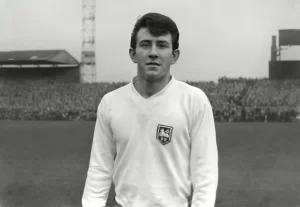
16-year-old Howard Kendall of Preston North End
Compared to those shocks, the 1-0 win by second-tier Preston North End over Nottingham Forest of the 1st Division after a replay was relatively minor. It came thanks to a goal by 16-year-old Howard Kendall. West Ham United saw off local rivals Charlton Athletic 3-0 thanks to goals from Geoff Hurst, Peter Brabrook and their own young prodigy, John Sissons whilst a top-of-the-table London derby saw Chelsea overcome Tottenham Hotspur after a replay and another all-First Division clash resulted in Arsenal squeaking past Wolverhampton Wanderers 2-1 at Highbury.
The 4th Round saw the fall of all three major giant killers from the previous stage. Newport County were drawn to face Burnley at Turf Moor and put up a brave performance before losing 2-1, whilst Aldershot were given a home draw but lost out 2-1 to Swindon Town. Bedford Town were also rewarded with a home tie. It was not Manchester United as they had hoped but Carlisle United who visited Queens Park and, in front of a record crowd of 18,000, ran out 3-0 winners.
Port Vale’s reward for their win at Birmingham was an even tougher away encounter with high-flying Liverpool awaiting at Anfield. Freddie Steele’s men surprised everyone by holding the champions-elect to a goalless draw but they then fell 2-1 at home in the replay.

Roy Vernon: Twice-taken penalty
Reigning champs Everton needed a twice-taken penalty by Roy Vernon ten minutes from time to salvage a draw against Leeds United at Elland Road before securing a 2-0 replay win whilst holders Manchester United were helped on their way to a 4-1 win over Bristol Rovers by a Denis Law hat-trick.
There were shocks elsewhere; Chelsea lost at Stamford Bridge to 2nd Division Huddersfield Town whilst Swansea Town, struggling near the foot of the 2nd Division drew at Bramall Lane before taking Sheffield United apart 4-0 at Vetch Field in the replay.
Meanwhile Preston claimed another top-flight scalp when seeing off Bolton Wanderers, after a replay. After a 2-2 draw at Burnden Park, Nobby Lawton set up Alex Dawson to put North End in front at Deepdale. Bryan Edwards headed an equaliser for the visitors but skipper Lawton slammed home the winner in the 75th minute.
West Ham were again drawn against local rivals. They needed to come from behind to draw 1-1 with Leyton Orient at Brisbane Road. Norman Deeley put the hosts in front just before half time but Peter Brabrook levelled just before the break.
Back at Upton Park, The Hammers quickly took control with goals from Geoff Hurst (2) and Johnny Byrne in the opening 16 minutes. Hurst had a second half penalty saved by Mike Pinner to deny him a hat-trick but it proved an easy 3-0 win.

Oxford United v Blackburn Rovers. Ron Atkinson and Ronnie Clayton
The biggest shock of the 5th Round came at The Manor Ground where Oxford United, skippered by Ron Atkinson and struggling near the foot of the 4th Division took on a Blackburn Rovers team 77 places above them in the league.
Over 27,000 crammed into the ground with fans hanging from trees outside and leaning out of nearby windows.
Oxford’s cup quest had started way back in November and wins over Folkestone, Kettering Town, Chesterfield and Brentford had seen Arthur Turner’s men through to the last 16.
Over 50 years later, Atkinson still had vivid memories of the day. Speaking to the ‘Oxford Mail’ in 2016 he said: “It was a wonderful occasion.
“At the time it was a record gate and for so many to come out and watch, it gave us a big lift.
“Blackburn were right at the top of Division 1 and we were a little Division 4 club”.
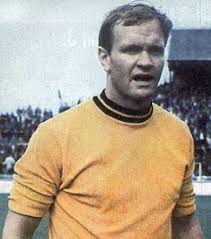
‘The Tank’
It was Atkinson, known as ‘The Tank’ who set the tone. “We kicked off and I went into, shall we say, a ‘physical challenge’ in the first minute”, recalls Ron.
”The Blackburn player went down, and I looked at his face, and I knew they didn’t fancy it.
“I shouted that to the rest of the players and straight away I knew we had a chance”.
And United seized it. Tony Jones put them two up and after Mike Ferguson pulled one back, Billy Calder got a third to confirm the home win and a place in the last eight
And the surprises didn’t end there with Swansea continuing their march with victory over Stoke City.
The teams drew 2-2 at The Victoria Ground to set up a replay at Vetch Field where second half goals from Jimmy McLoughlin and Keith Todd saw The Swans home.

Sunderland on the attack against Everton
Another 2nd Division team, Sunderland, took on champions Everton. 62,827 crammed into Roker Park and they saw the hosts race into a 3-goal lead before half time through Jimmy McNab, Charlie Hurley and a Mick Meaghan own-goal. Jimmy Harris pulled one back for the visitors but the Black Cats held on comfortably for a famous win.
Preston continued to progress with a single-goal victory over Carlisle United – Alan Spavin providing the winner, and West Ham United travelled to Swindon and safely qualified with a 3-1 success. Geoff Hurst gave the Londoners an early lead. A Mike Summerbee cross was headed home by Ken McPherson to tie it up but late goals from Johnny Byrne and Hurst again saw the Londoners through to the last eight.

Swansea fans at Anfield
In the quarter-finals Swansea Town travelled to champions-elect Liverpool and shocked Bill Shankly’s men as goals from Jim McLoughlin and Eddie Thomas saw them through to the last four in front of 52,608 fans.
In an amazing 6th round contest Manchester United finally won through against Sunderland after Alan Brown’s Wearsiders looked like they had seen off the Old Trafford giants on numerous occasions. In the first game Sunderland twice led by two goals and still held the two-goal advantage with just minutes remaining. The Black Cats must have felt they were home and dry but 17-year-old George Best had other ideas, first crossing for Bobby Charlton to head home then equalising with just a minute remaining.
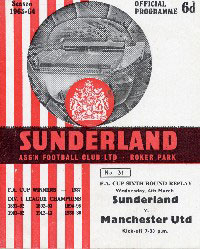
In the replay at Roker Park, Nick Sharkey gave the home team the lead but Denis Law equalised to take the game into extra-time. An own-goal by Maurice Setters put Sunderland ahead yet again but a late header from Bobby Charlton earned United a third match.

Sunderland captain Charlie Hurley and Manchester United skipper Denis Law
The third match was played at Leeds Road, Huddersfield, attracting a sell-out crowd of 54,892. Sunderland yet again took the lead through Sharkey. Law equalised for United and then scored again to give his team the lead for the first time. This seemed to weaken the Roker Park team’s resolve and United raced away to a 5-1 win with Law claiming a hat-trick to go alongside strikes from Phil Chisnall and David Herd.
In the other two quarter-finals West Ham took on Burnley at Upton Park whilst Preston travelled to giantkillers Oxford United.
The Upton Park encounter was a thriller. John Connolly burst through to give Burnley an early lead which they held until the break. Early in the second period John Sissons sent over a cross which an under-pressure Alex Elder turned past his own keeper and then John Byrne completed the turnaround with a superb goal.
Byrne doubled the lead but a Ray Pointer goal heralded a late siege on the West Ham goal which Bobby Moore and his fellow defenders withstood.
At the Manor Ground it was Preston who dominated early on and goals from Alex Dawson and Tony Godfrey seemed to have them firmly on the way to the last four. A Tony Jones goal galvanised both Oxford and the 22,500 crowd but the Lancashire team, with Alan Kelly at his best, held on for a narrow win.

And so to the semi-finals where the draw pitted West Ham United against Manchester United with Preston North End meeting Swansea Town ensuring there would be a 2nd Division team in the final.

‘Quagmire’
Both semi-finals were played in quagmire conditions on a day when the majority of league matches were postponed due to the conditions.

Bobby Moore and Denis Law search for the coin
At Hillsborough 65,000 saw a tough battle between the two 1st Division sides. They had met a week before at Upton Park with the men from Manchester running out comfortable 2-0 winners despite resting George Best, Denis Law and Bobby Charlton with an eye on the cup tie.

Moore lies injured
First blood almost went to United when Best hit the bar in an opening period of few chances. After the break Ronnie Boyce gave West Ham, who played with the same 11 players they had in every round, the lead with a fine long-range effort after 56 minutes and then doubled the advantage six minutes later converting a cross after a corner. Law got one back for United but Geoff Hurst restored the two-goal difference almost immediately to send the Hammers to Wembley for the first time since that first-ever final in 1923.

Meanwhile Aston Villa’s Villa Park hosted Preston North End, Swansea Town and 68,000 fans.
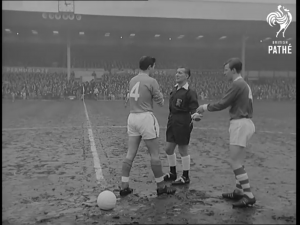
The Captains meet at Villa Park
The all-2nd Division clash was also played in swamp-like conditions and both teams found it difficult to adjust in the early going.

Singleton’s strike hits the net
It was Town who proved the stronger team in the first half and it was no surprise when Jim McLaughlin gave the Welshmen the lead just before the break. Shortly after the interval Preston were awarded a penalty which Alex Dawson confidently put away and it was North End who booked their ticket for Wembley with a stunning 40-yard strike from centre-half Tony Singleton.
Singleton, who was cleared to play just before the game after suffering a muscle injury posing for a photo, tried a pot shot which caught Swansea ‘keeper Noel Dwyer off his line and sailed into an empty net.
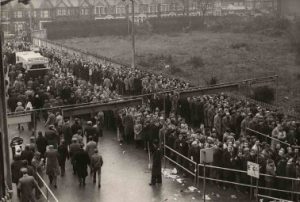
Queueing for final tickets at Upton Park
So, it was two teams with a long association with the Twin Towers that made it to the final. West Ham had been present in that first-ever final in 1923 whilst Preston, making their first Wembley appearance for 10 years, were hoping to capture the crown for the first time since a 119th minute penalty from George Mutch gave them victory over Huddersfield Town in 1938.


The line-ups
There were no surprises in either line-up and managers Jimmy Milne and Ron Greenwood (whose team had remained unchanged throughout the competition) led their teams on to the hallowed turf in front of 100,000 fans.
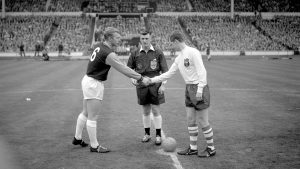
Skippers Bobby Moore and Nobby Lawton shake hands under the watchful eye of referee Arthur Holland
After that stunning semi-final win over Man Utd and given their top-flight status, The Hammers started clear favourites. But it was Preston who took the lead after 10 minutes when Howard Kendall who, at 17 years and 345 days was becoming the youngest player to appear in the final, started a move that resulted in Jim Standen fumbling a shot and Doug Holden stabbing home the rebound.

Kendall tries out the Wembley turf
After trying out the Wembley pitch 24 hours before kick-off, Kendall had called himself “The luckiest young man in the world’ to be playing in the final. “I took a sleeping tablet last night and I’ll take another one tonight”, he added

The goalscoring heroes
West Ham struck back quickly and it was 18-year-old John Sissons who got the leveller just two minutes later, playing a one-two with John Byrne before firing home. In netting he became the youngest player to score in a final.
Just before half time the Lancashire team took the lead again when Alex Dawson headed home a corner following a collision between Standen and Ken Brown.
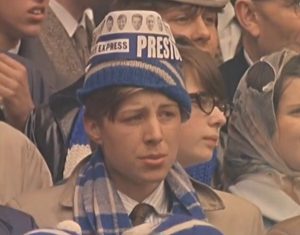
A dejected Preston fan
Soon after the interval West Ham were level again. This time a corner by Peter Brabrook saw Brown outjump Dawson and head across goal. A second header from Geoff Hurst struck the underside of the bar and rebounded off the back of an unfortunate Alan Kelly and into the net.
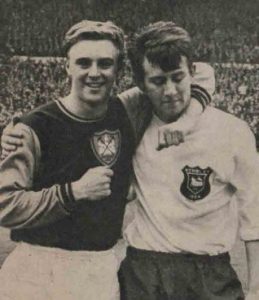
Youngster. John Sissons, the youngest scorer in a Wembley final consoles Howard Kendall, the youngest player.
With the clock approaching 90 minutes and extra-time looming, Hurst found Brabrook who delivered a perfect cross for Ronnie Boyce to head home the winner and the trophy was heading to East London for the first time.

Ron Greenwood with the cup on the tube
West Ham manager Ron Greenwood would admit later that he used diversity to help his team get in the right frame of mind for their success, particularly prior to the semi final win over Manchester United.
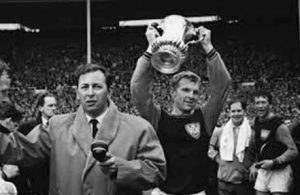
Bobby Moore holds the trophy aloft, David Coleman talks to the nation
John Lyall had injured his knee earlier in the campaign playing in a reserve match against Cardiff City with the injury forcing him to stop playing at the age of 24 after two attempted comebacks. Greenwood used Lyall’s forced retirement to motivate his players and also reminded them that making the Wembley final would ensure a good turnout for Lyall’s testimonial.

Happy Hammer
Six days before the final a full West Ham team lined up against an All Star XI at Upton Park in front of an 18,800 crowd who saw the Hammers win 5-1 with four goals coming from Geoff Hurst and one from sub Harry Redknapp.

West Ham’s victory parade
For West Ham the victory would lead to another Wembley appearance a year later when they saw off 1860 Munich to take the European Cup Winners Cup. And of course, team members Bobby Moore and Geoff Hurst would, alongside another Hammer, Martin Peters, play big roles at Wembley in 1966.
Preston’s 3rd place finish in the 2nd Division in that Cup final season was the closest they have come to returning to the top flight and youngster Kendall would have to move on to Everton before gaining the success his talent undoubtedly deserved.
Give the number of shocks on the road to the final it would perhaps have been apt if North End had ‘completed the job’ and took the cup at Wembley. But it was not to be, as Bobby Moore lofted the trophy and the Hammers took the Cup home for the first time.

